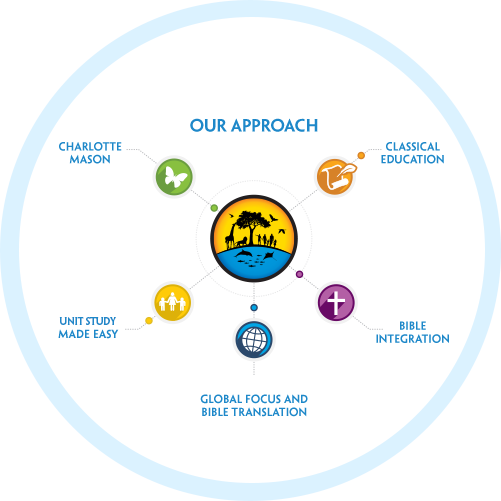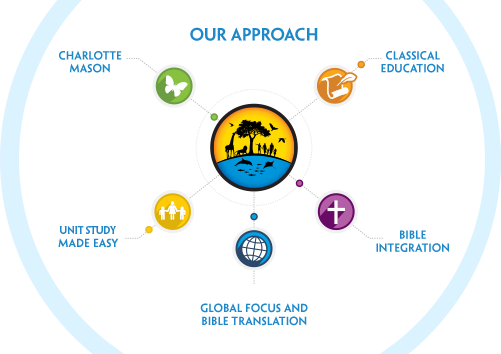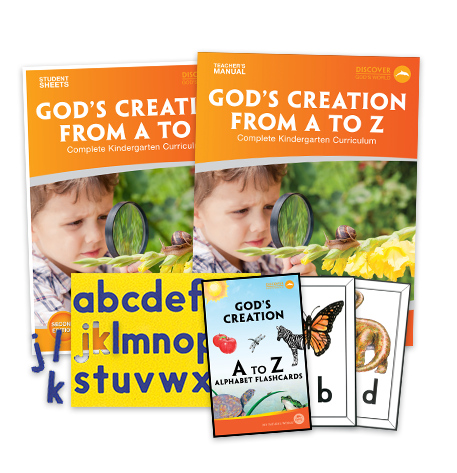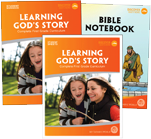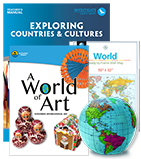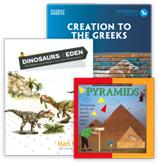 S2K Commerce - Products Dropdown
S2K Commerce - Products Dropdown
 Web Content Viewer
Web Content Viewer
Charlotte Mason Method
At My Father's World, we bring the proven teaching methods of Charlotte Mason to life by incorporating key elements of her educational philosophy into our curriculum. A British educator who dedicated her life to improving education quality in England in the late 1800s and early 1900s, Charlotte Mason believed that children should be educated on real ideas through their natural environment. According to Charlotte Mason, "Education is an Atmosphere, a Discipline, a Life."
Charlotte Mason's key principles and ideas that are integrated into our Christian homeschooling curriculum include:
1. Structured Mornings with Short Lessons and Unstructured Afternoons
At all levels, our curriculum is designed to quickly and efficiently teach a wide range of information from all the core subjects. This leaves plenty of time for additional study in subjects such as foreign languages or piano. The afternoon is available for play, exploration, crafts, hand-work, nature walks, acts of service, and household chores. For example:
God's Creation from A to Z (Kindergarten) takes only 60-90 minutes daily to cover all core subjects. By integrating subjects into thematic units, a variety of subjects are taught in a short amount of time. Children learn letter names/sounds, short vowel words, and how to read simple short stories. Hands-on science focuses on God's creation. Math, art, creative thinking, Bible, character development, music, children's literature, and nature exploration also are included.
Learning God's Story (First Grade) takes only 1 ½ to 2 hours per day to cover all core subjects. Using a phonics approach, children are taught to become independent readers by the end of the year. Includes language arts, Bible-related history, hands-on projects, nature studies, math, art, music, and suggestions for read alouds.
2. The Study of Other Countries and Cultures Early in the Educational Process
To avoid an "arrogant" habit of mind, year one in our Family Learning Cycle for elementary and middle school starts with Exploring Countries and Cultures. It focuses on continents and selected countries, their cultures, geography, way of life, languages, and the explorers/missionaries that have affected them. This includes map work and read-alouds. Hands-on projects (cooking, crafts, etc.) help make other cultures "come alive" for children, building a foundation for studying world history in later years.
3. The Study of History in Chronological Order
By studying history in chronological order and providing comparisons across countries in any given time period, our approach makes history more interesting and more understandable for both children and adults. Years two through five in our Family Learning Cycle cover history in chronological order.
In Creation to the Greeks, the biblical story provides the framework, with simultaneous study of Egypt, other early civilizations, and Greece. Rome to the Reformation focuses on Jesus/Acts/Rome through the Middle Ages. The final two years, Exploration to 1850 and 1850 to Modern Times, focus on U.S. history in the context of world events.
4. Reading Great Literature "Living Books" Aloud
Probably the best known of Charlotte Mason's methods is her focus on living books. She believed that children should not be introduced to subjects through dry, factual textbooks. Rather, she preferred books written by an author who exhibited a passion for the topic and wrote in an engaging, literary style that presented great ideas rather than mere facts. Her view was that reading great literature aloud made the people, places and events "come alive" whereas most textbooks were "written down" to children by a committee.
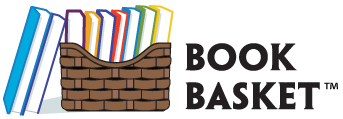 Each of our curriculum packages has been assembled with living books chosen
for their biblical worldview, ability to inspire, and encouragement of godly character. Rather than
relying on textbooks, we use exciting living history books such as The Story of the World,
Pilgrim Adventures, George Washington's World, and Salt and Light.
Each of our curriculum packages has been assembled with living books chosen
for their biblical worldview, ability to inspire, and encouragement of godly character. Rather than
relying on textbooks, we use exciting living history books such as The Story of the World,
Pilgrim Adventures, George Washington's World, and Salt and Light.
Plus, each program from preschool to 8th graders includes an optional extensive library list of prescreened literature books that we refer to as Book Basket™. This list of recommended books typically includes picture books, biographies, non-fiction books, and more difficult read-alouds – that give "life" to the topics being studied.
5. Creation of Historical Timelines and "Notebooking"
In elementary and middle school grades, students create their own timeline and history notebook in our version of Charlotte Mason's Century Books. High school students expand on this to create several detailed timeline books showing events world-wide.

Weekly nature walks make learning more fun and memorable.
6. Weekly Nature Walks with "Notebooking"
Our approach features weekly nature walks so that children directly experience God's creation. To capture your budding artist's latest creations, nature notebooks are an integral part of science in subsequent years.
7. Direct Contact with the Bible from an Early Age
We begin studying the Bible in preschool with Bible stories that focus on character traits and the learning of simple memory verses. In Pre-K, Bible stories are taught in greater depth, with students learning that Jesus is the greatest treasure of all. In kindergarten, the seven days of Creation (with text directly from the Bible) are taught as a foundation; then the focus shifts to God's Creation with 26 hands-on units. For each unit, there are Bible verses that apply to the theme and a Bible/character development concept (such as "Jesus is the light of the world" for S-s-sun).
Learning God's Story (First Grade) focuses on the Bible in chronological order from Genesis to Revelation. Reading to children from the Bible allows them to hear God's Word as it was written. Children memorize selected verses from Proverbs and copy the verses for handwriting practice. By mid-year, children are reading a My Father's World Bible Reader designed at their reading level.
Students in Adventures in U.S. History and World Changers use a student Bible, written at a 3rd grade reading level, so that they can begin to find the treasures in God's Word for themselves.
In Exploring Countries and Cultures, students study Matthew with a special emphasis on applying it to develop God's heart for the world in their own lives. Creation to the Greeks and Rome to the Reformation use the Bible as a base text for history, combining it with other books to give a picture of the world at that time. The following years look at modern history and discuss the effect that the Bible had on events such as the writing of the U.S. Constitution.
8. The Absence of "Twaddle" and the Focus on Narration
If you've heard of Charlotte Mason, you've probably also heard of her dislike for "twaddle," which we define as the unnecessary repetition of information to keep the child pointlessly occupied with "busy work." We focus on developing a child's skill of narration – the art of being able to retell what you've just read or heard – from the beginning of their educational experience. Children who learn how to narrate are more confident speakers, who more efficiently organize their thoughts, and recall details better.
Homeschool Made Easy
My Father's World makes homeschooling easy by combining the best of Charlotte Mason's ideas, Hebraic classical education, and unit studies with a biblical worldview and global focus. Learn more about our Innovative Approach to Homeschool.
